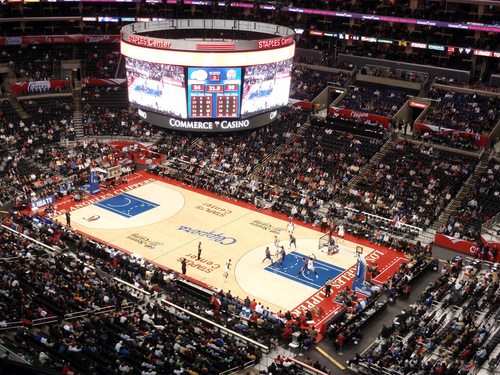
Eric Broder Van Dyke / Shutterstock.com
May 3, 2014; Los Angeles Times
The smoke and mirrors aspect of disgraced Los Angeles Clippers owner Donald Sterling’s philanthropy was the focus of a lengthy analysis in the Los Angeles Times last week. It led off with one of several interesting examples:
“The publicity campaign promised a new summer program at Point Dume for poor children, funded in part by the Donald T. Sterling Charitable Foundation. A smiling Sterling was shown next to a horse in some newspaper ads. In others, the foundation described the project as ‘the 20 Acre Malibu Farm & Horse Ranch Estate as a free summer camp for underprivileged kids, ages 6-14.’
“Initially the camp was to open in 2014, offering horseback riding, golf, a new pool and tennis court, even a helipad; more recently, advertisements said it would debut in 2016. But Malibu officials said Sterling has filed no proposals with the city for the project. And Darren Schield, the Sterling foundation’s chief financial officer, said he had no information about plans to fund the Malibu ranch. Sterling did not respond to requests for comment.”
Los Angeles Times readers are quite familiar with the breathtakingly cheesy ads placed by the Sterling Foundation, heavily promoting his good works. They featured pictures of the billionaire Clippers owner and numerous beneficiaries of his philanthropy, including prominent civic leaders, politicians and leaders of groups that serve minorities and the underprivileged.
Some of the ads said the foundation was committed to making between $10 million and $20 million in donations, but its actual giving has been much smaller. Some of Sterling’s most touted projects, such as the Malibu children’s camp and earlier plans for a skid row homeless center, never happened.
Sterling began the foundation in 2009, and through the end of 2012, it gave out about $1.4 million. Most were grants in the $5,000 to $20,000 range, to such community-based nonprofits as Para Los Niños, the United Negro College Fund and the Union Rescue Mission. The work of the foundation was heavily promoted.
While some beneficiaries told The Times they were grateful, others were turned off by what they considered Sterling’s relentless self-promotion, even before the NBA banned the Clippers owner for life last week for a recording in which he made racist remarks.
The newspaper notes that Sterling, whose estimated net worth is $1.9 billion, began funding the charity the same year he paid $2.7 million to settle a federal housing discrimination lawsuit. His company owns numerous apartment buildings across Southern California and has been sued for refusing to rent to African Americans, Latinos, and families with children.
Another case in point was 100 Black Men of Los Angeles, a youth mentoring program that received $5,000 in 2009. Some members told the Times that they were hesitant to take the money after hearing about the housing discrimination allegations, but they decided it was more important to provide scholarships to disadvantaged students.
Sign up for our free newsletters
Subscribe to NPQ's newsletters to have our top stories delivered directly to your inbox.
By signing up, you agree to our privacy policy and terms of use, and to receive messages from NPQ and our partners.
But then a photo of the organization’s president began appearing in newspaper advertisements, and group members were disturbed by that, so the organization asked Sterling to stop using its name and logo in the ads—a request that was ignored. When the group heard that former Clippers general manager Elgin Baylor had sued Sterling for wrongful termination and had accused him of fostering a “plantation mentality,” 100 Black Men returned the money and sent a cease-and-desist letter demanding that he stop using its name and logo in the ads.
“I think he was pimping us to get credit for helping the African American community,” Pastor Jewett Walker Jr., the group’s current president, told the paper.
In yet another case, the Sterling foundation pledged $10,000 annually for 10 years to A Place Called Home, a nonprofit organization for disadvantaged children in South Los Angeles.
“Suddenly, my picture showed up in the L.A. Times in those ads,” Jonathan Zeichner, the group’s executive director, told the Times, saying he did not recall giving the foundation permission to use his image. Zeichner said the recording released last week “crystallized” his feeling that the foundation’s giving was intended to boost Sterling’s image.
The Times would not provide details about the ads to its own reporters, telling them that it was company policy not to disclose information about advertisers.
Sterling may have made charitable contributions as an individual that would not appear in the foundation’s tax filings, making it impossible to determine how much he has given to charities overall. One example of Sterling’s personal philanthropy is a $425,000 donation in 2013 to UCLA for kidney research, the first installment of a $3 million pledge to be paid over seven years. But UCLA returned the money and canceled the pledge after the furor over his remarks.
The Times reports on how Sterling’s “now-abandoned interest in funding a skid row homeless center reflects both the pomp and the uncertainty that surrounds his charitable activities:
“About six years ago, newspaper ads started appearing saying that Sterling wanted to build a homeless center in downtown Los Angeles. Andy Bales, chief executive officer of the Union Rescue Mission, said Sterling talked to skid row nonprofits about helping him raise $50 million for a Donald Sterling Homeless Center. Bales and other officials on skid row thought the idea unrealistic, and Sterling eventually dropped it.”
Bales told the Times that he appreciates the money his nonprofit has received from the Sterling foundation—$20,000 through 2012: “We keep doing good with whatever revenue we get from sometimes imperfect people.”
“He is somewhat unique in how much he’s bragging about his philanthropy,” Ken Berger, president of Charity Navigator, told the Times, “He’s shouting from the rooftops, ‘Look how generous I am!’”
The Clippers have a separate foundation, incorporated in 1994. In fiscal 2011-12, that foundation spent about $633,000 on charitable programs, including grants to groups such as Feed the Children Inc. and the Special Olympics of Southern California. It is governed by a board made up of Clippers employees.—Larry Kaplan











